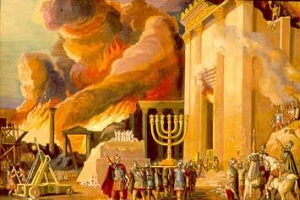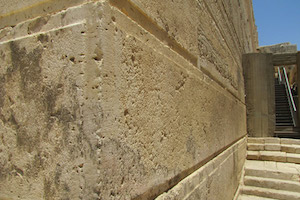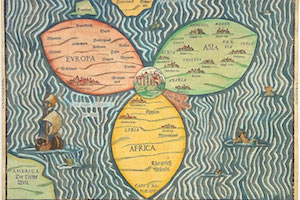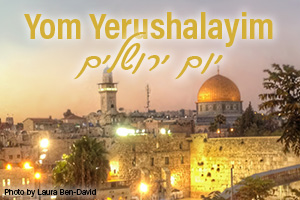I’m not religious so why should I care about Tisha B’av?
As an atheist Jew I have been challenged to question each of my Jewish practices. Why would I fast on Yom Kippur? Why do I keep Passover? And in regards to the upcoming holiday (which is more a holy day than a holiday), why do I care about Tisha B’Av? The short answer, and cue the Fiddler on the Roof soundtrack, is tradition.
Most people think of Judaism as a religion but, in actuality, it is that and more. Judaism, the first monotheistic religion, also encompasses a culture, a nation, a rich history, and for me, it is my family. When I cut out the belief in God, I am still left with the food, songs, family, and values that will last a lifetime.
When I fast on Yom Kippur, I do so because I find value in reflection upon my mistakes. Additionally, as someone who can become obsessive in my regrets, I find great comfort in taking one day to reflect and subsequently forgive myself.
Furthermore, there is an incredible feeling knowing that while I reflect individually, every single Jew across the world is doing the same. My family, those I know and those I don’t know, those who live in this time period and those who came before me, all engaging in activity to make ourselves individually better people, and thus a better community. This is one of the ritual activities that, over the centuries has made the Jewish People stronger, together.
Passover is about our Jewish history. There is nothing I love more than stories and conducting a seder is an interactive story with an incredible message. Every Jewish figure is my great great (etc) grandfather or grandmother. I am part of a tribe with a more than 3000 year old history! This means their history is interwoven into mine. Whether or not it was God that sent the ten plagues to get the Jews out of Israel is irrelevant to me.
A seder is about appreciating the struggle of our ancestors as slaves in Egypt. Their bravery and fortitude in leaving Egypt, their exhaustion while wandering the desert, and their acceptance of the laws that have become the definitive guidelines for what is a moral society. Passover teaches me empathy with all people who suffer and are oppressed.
Although today most Jews may live comfortable lives, we too, were once slaves in Egypt. It teaches me not to take freedom or Israel for that matter, for granted. If I think refraining from carbs for a week is difficult, then I am experiencing the tiniest fraction of what my ancestors endured in order for me to be here today.
This brings us to Tisha B’Av. A commemorative day that is the perfect combination of reflection and Jewish history. As the granddaughter of a Holocaust survivor, Tisha B’Av’s importance is crucial. Remembering the struggle of my distant ancestors, as well as the feat of my Papa and his family, are inextricably linked and equally relevant.
In fact, knowing and sympathizing with the stories of my grandfather only deepens my connections to my more distant ancestors. If I can understand my Papa’s story, I can understand the struggles of all my Jewish ancestors, no matter how far removed I may be.
Reflection of Temple Mount © Laura Ben-David
So what is Tisha B’Av?
Tisha B’Av, the 9th day of the month of Av (Jewish calendar) is the day when both the first and second Temples were destroyed, the first by the Babylonians in 586 B.C.E.; the second by the Romans in 70 C.E.
The destruction of the Jewish Temple meant the destruction of the most holy, pivotal location to the Jewish religion, culture and people. Destruction of the Temple was an attempt to destroy the Jewish nation – take out the cultural linchpin, the one element that holds everyone together.
Tisha B’Av is a day of mourning and considered the saddest day in the Jewish calendar. While Yom Kippur is a solemn day, it is a holiday. Tisha B’Av is a Holy Day but not a holiday. It is a day of mourning and misery, a day to grieve what was lost and the suffering that was caused. On this day, religious Jews fast and observe other prohibitions to emphasize the sadness of the day.
According to Jewish tradition, five calamities occurred on Tisha B’Av that warrant fasting:
- The lack of faith of the Jews who upon return of the 12 Spies from scouting out the Land of Canaan, chose to believe the 10 spies who reported that the land promised by God would be impossible to settle.
- The destruction of the First Temple (586 B.C.E.)
- The destruction of the Second Temple (70 C.E.)
- The Roman crushing of the Bar Kochba revolt and subsequent destruction of the city of Betar where over over 500,000 Jews were killed.
- The plowing under of of the site of the Temple and the surrounding area following the Bar Kokhba revolt (135 CE)
Over time, Tisha B’Av has been expanded to encompass mourning for all horrible events in Jewish history. Therefore Tish’a B’av includes the Spanish inquisition, the Holocaust, and the repeated expulsion of Jews from European countries among other horrible Jewish events. Tisha B’av is “marked” by a fast and a day of learning (Torah study is forbidden on Tisha B'Av as it is considered a spiritually enjoyable activity except for the study of distressing texts).
I find this to be the most inspiring aspect of the day. Not only do Jews take a day to remember these events, but they also engage in learning to further their understanding. For some Jews, this is a day to grapple with God allowing such vehement evil in the world. For others, it’s the opportunity to expand our knowledge of the seemingly constant Jewish struggle.
The destruction of the Second Temple, represents the most poignant instance in which the Jewish people faced violent adversity. The cultural epicenter of Jewish life was destroyed and the Nation of Israel was sent to a 2000 year long exile. How do a people retain their nationhood exiled from their land, scattered from their community and disconnected from the spiritual leadership that dictated the pattern and rhythms of Jewish life?
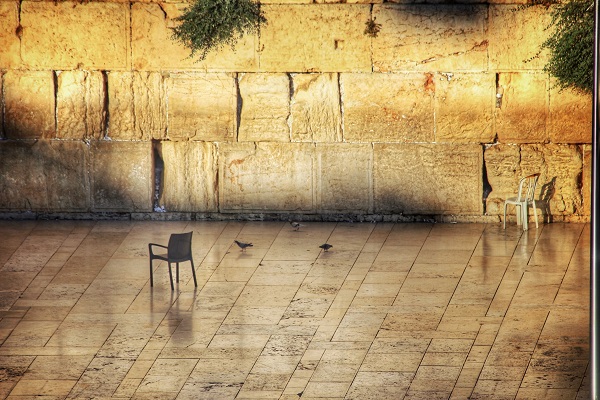
The Kotel © Laura Ben-David
While I don’t find myself mourning the Temple as a place to pray, Tisha B’Av is an opportunity for me to contemplate the loss of culture, the shattering of the community and exile from the homeland to become strangers in a strange land, ever at the mercy of others.
In this light, the continued existence of the Jewish People as a Nation defies all understanding. And then there is Israel.
Tisha B’av is about remembering the Destruction of the Temple, the almost-destruction of the Jewish Nation, but every other day in the land of Israel is about celebrating our continued Jewish existence.
Mourning the Holocaust is difficult, but crucial in understanding the traumatic events which the Jewish people continually overcome. Tisha B’Av is similar, reaching back much further into our history - a lesson that the Holocaust is not the singular tragedy of the Jewish People but rather one of many attempts to eliminate our existence.
It is the rebirth of the Jewish State that serves as tangible proof of resilience of the Jewish nation - Tisha B’Av is a annual reminder of the difficulty in retaining Jewish Nationhood without a cultural, societal linchpin that holds us together. The Temple was the heart of the religion but it was also the place where Jews made pilgrimage three times a year, a place of ingathering, a place of unity.
While many Jews do not find themselves in practice of the religion, 2000 years have not changed the need to retain Nationhood through Jewish identity, shared values, purpose and unity. While we may not look to the Temple, we can look to Israel.

While some believe that miracles from God enabled the Jewish people to overcome, against all odds, I believe that it is the singular strength, the unique unity and spirit of the Jewish Nation, our ancestors, that has made this possible. Whether or not your Jewish identity includes the belief in God, there is always room for greater Jewish learning and understanding. If you believe in God, then Tisha B’av is a way to deepen your relationship with God by acknowledging the challenges He has given to the Jewish people and the miracles that have enabled them to be overcome.
If you identity as culturally Jewish, then Tisha B’av offers greater understanding of Jewish culture, the history from which it stems and the centrality of Zion in uniting the Jewish people over the centuries. If you identify with the tribal aspect of Judaism, Tisha B’av is a timeline of your family’s history and the obstacles they have overcome for you to be reading this today. If you identity with the land of Israel and the Jewish nation, Tisha B’av encapsulates the rarity of Jewish people having freedom to practice their religion and the miraculous achievement of the rebirth of the Jewish State and reunification of Jerusalem.
We are all different and may identify with any or all of these aspects but what is certain is that, if you identify as Jewish, Tisha B’av is for you.
Recommended for you:
JERUSALEM CORNERSTONE PROJECT
Celebrate your connection to our eternal holy city by bringing a piece of Jerusalem into your home and hearts.
About the Author


